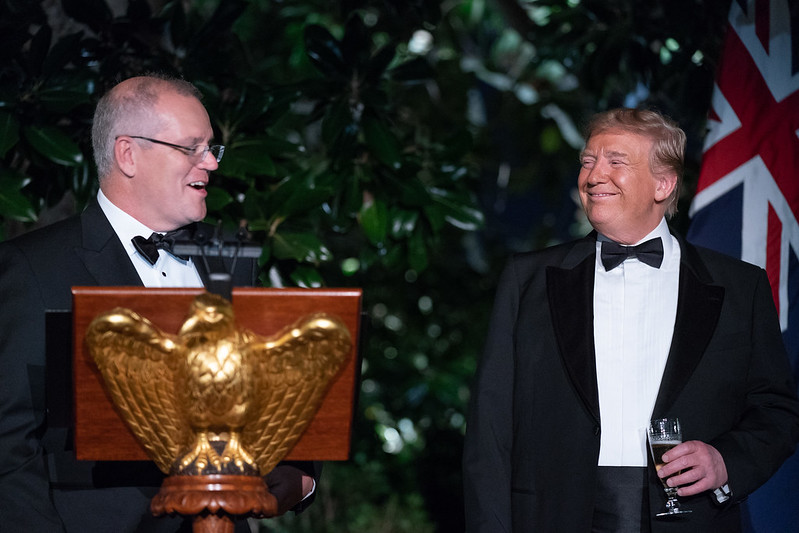In his Lowy lecture delivered in Sydney last October Prime Minister Scott Morrison declared that ‘Australia does not have to choose between the United States and China.’

It was such a commonplace comment that it passed without notice. It had been articulated by assorted Australian leaders many times before. But now seven months later it seems to belong to a different era. So much has changed, the pandemic to begin with. But equally important are developments in American politics.
In response to the widely reported and recognised chaos in the White House, President Donald Trump has already sketched out his tactics for the presidential election in November. He will lead a crusade against China. Joe Biden is to be attacked for being ‘Bejing Biden’, a man without sufficient vigour to confront America’s rapidly emerging rival. As the American response to the pandemic comes under increasing and merited criticism, the anti-Chinese rhetoric will escalate. If the polls turn down Trump’s confrontation will become more central to the campaign. American allies will be expected to join the crusade with the more compliant ones leading the march. It is fanciful to think that Australia will choose to sit on the sidelines.
So does Australia have to choose between America and China? Clearly not. The decision has already been made for us. For many years it has been the height of our strategic planning to lash ourselves as tightly as possible to the Imperial mast and to then stop thinking. And if you are joined at the hip with a great power, as Malcolm Turnbull phrased it, there is almost no room to manoeuvre or to change direction. The American alliance has always been oversold to the electorate and so little thought has been given to alternative ways of acting in the world of nation states that we have nowhere else to go.
Like the Republican Party itself we will be swept along in Trump’s wake whether we like it or not. Several recent developments point us in this direction. It stretched credulity to suppose that Morrison’s loud-mouthed call for an international inquiry into China’s handling of the coronavirus outbreak was not made as an accompaniment to the rising tempo of Trump’s own campaign .
And there are other serious constraints on Australian governments and none more obvious than the extraordinary power of the Murdoch Empire. Rupert Murdoch is not just any American tycoon. He is deeply immersed in conservative American politics. Fox news is central to Trump’s power base. The News Limited papers would clearly not look on quietly and allow an Australian government to move beyond the penumbra of American power or even take up positions contrary to the direction of Trump’s campaign.
The recent Daily Telegraph exposé of what purported to be Five Eyes intelligence about China’s viral culpability was merely a foretaste of what is yet to come. The information, assumed to have been provided by the American embassy ,was quickly taken up and sensationalised by Fox news and from there was incorporated into a speech by Secretary of State Mike Pompeo. The slickness of the operation was breathtaking. And where was that clutch of right wing commentators and the chronically leaking security establishment who warn us endlessly about foreign interference? It obviously depends on who you consider foreign.
What has become clear over the last few months is that many Australians are willing to applaud the rupture in relations with China. Members of Canberra’s defence and security establishment have always prioritised our ties with the US. In that way they are the lineal descendants of the Imperial loyalists of a hundred years ago who had difficulty distinguishing between Australian interests and those of Britain and the Empire. Like Menzies they were proud to be British to the bootstraps. Cold War thinking encouraged many Australians to believe their first loyalty was to the ‘free world’ rather than the nation state. And old habits persist. We pursue what is called interoperability with American forces. Our ships sail with American flotillas in both the South China Sea and the Persian Gulf.
But there has been a significant change in attitudes to China in the broader community which may prove more important in the long run. Leading commentators have shed their erstwhile objectivity. Right wing members of the Coalition’s back bench winch up their rhetoric. The public broadcasters, the ABC and SBS, turn repeatedly to known enemies of China which is now judged by standards not applied to other powers least of all the USA. But more troubling are the inexcusable attacks on long standing members of the Australian-Chinese community who, without evidence, are accused of being Communist sympathisers or even cadres of the party. What we have now is a replay of the Cold War pursued by a generation with no experience of the old one. They engage in exercises of recapitulation without knowing what they do.
Another development is the upsurge of anti-Asian racism. Though primarily directed at Chinese anyone with East Asian characteristics is vulnerable. A survey by the ABC found that hundreds of people across the country had either witnessed or been involved in racially charged incidents in supermarkets, on the streets and in their cars. Some say they are now too frightened to go shopping by themselves or even take a walk around the block in their own neighbourhoods. Racist graffiti reappears.
It is as if Pandora’s Box has been thrown open and all the atavistic attitudes to Asia have re-emerged. The earnest, exaggerated talk of politicians and commentators about the threat of China to our sovereignty and security has created an atmosphere where many people feel free to vent long nurtured prejudices. These inadvertent enablers may personally find such crude racism distasteful but it is an inevitable consequence of their alarmist rhetoric.




